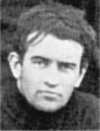Art Poe
 |
|
| Date of birth | March 22, 1879 |
|---|---|
| Place of birth | Baltimore, Maryland, U.S. |
| Date of death | April 15, 1951 (aged 72) |
| Place of death | Cedar Rapids, Iowa, U.S. |
| Career information | |
| Position(s) | End |
| College | Princeton |
| Career history | |
| As player | |
| 1900–1901 | Homestead Library & Athletic Club |
| 1902 | Pittsburgh Stars |
| Career highlights and awards | |
|
|
Arthur "Art" Poe (March 22, 1879 – April 15, 1951) was an American football player and businessman, and one of six celebrated Poe brothers—second cousins, twice removed, of American author Edgar Allan Poe—to play football at Princeton in the late 19th and early 20th century. He was selected retroactively by the Helms Athletic Foundation as the national college football player of the year for 1899, and was elected to the College Football Hall of Fame in 1969.
Poe attended Princeton University, and was named to Walter Camp's All-American football second team in 1898 and first team in 1899. He was one of the Poe Brothers, six celebrated American football players – second cousins, twice removed of American author Edgar Allan Poe – to play football at Princeton in the late 19th and early 20th century. Arthur made the plays that led to victories over Yale in 1898 and 1899. In 1898 he took the ball from a Yale runner's grasp and raced 100 yards for the game's only score. Remarkably, he almost repeated the feat in the game's second half when he ran 90 yards with a Yale fumble for an apparent touchdown before the ball was ruled down where it had been recovered.
In 1899, Poe volunteered to attempt a game-winning field goal with only 30 seconds to play. Poe, despite never having before kicked in a game, volunteered to kick because both of Princeton's kickers had left the game due to injury. His kick was good and brought about an 11-10 Princeton victory over Yale. In 1914, a Pittsburgh Press article declared the last-minute winning field goal "Football's Greatest Moment." Both his winning run in 1898 and kick against the Elis in 1899 were celebrated in comic, quasi-epic poems by fellow Princeton grad M'Cready Sykes in a book entitled "Poe's Run and Other Poems." Of Poe's long touchdown run to beat Yale 6-0 in 1898, Sykes penned:
...
Wikipedia
